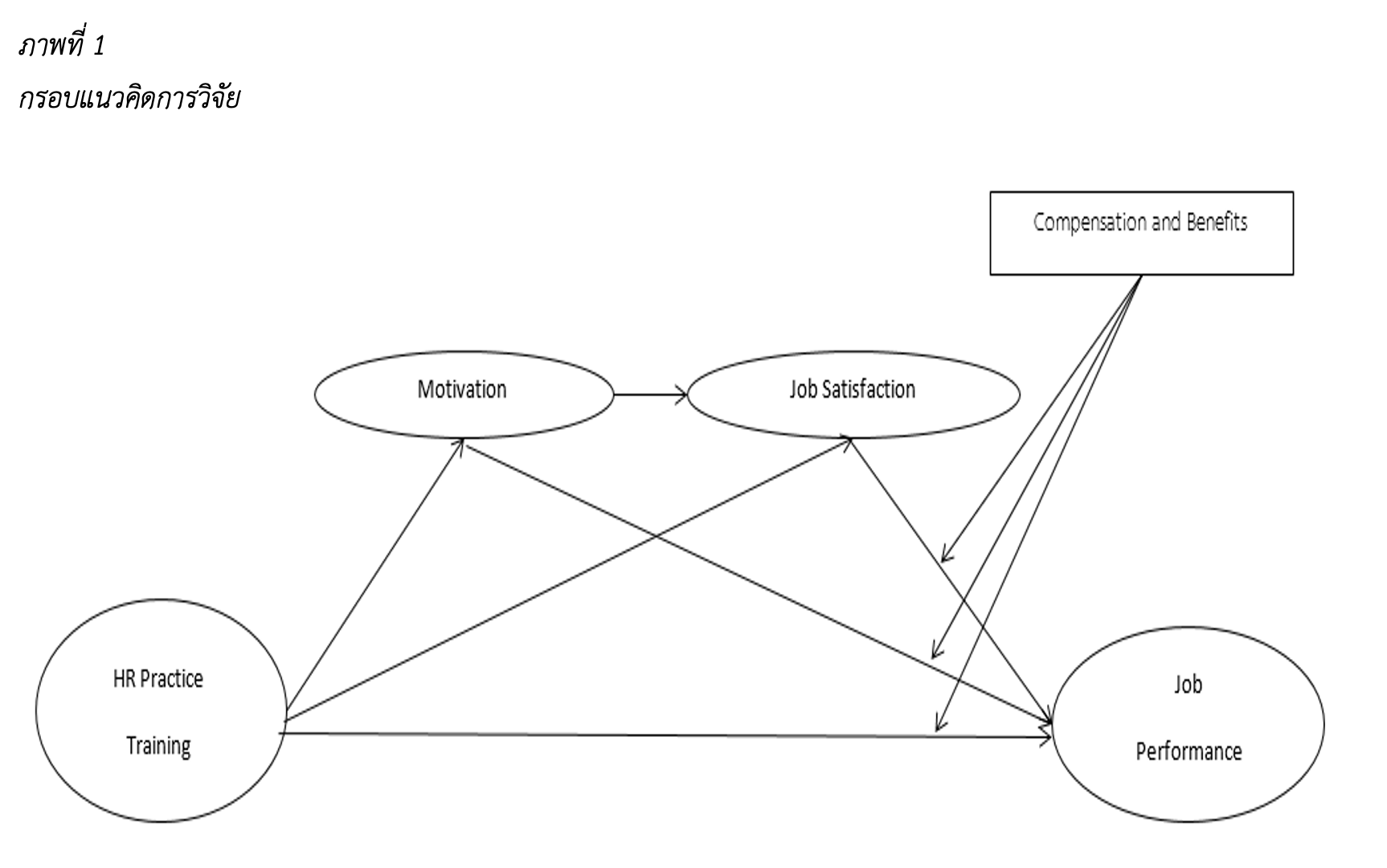ผลกระทบของกระบวนการฝึกอบรมที่มีต่อผลการปฏิบัติงานของพนักงานในธุรกิจโรงแรมของกรุงเทพมหานคร
Main Article Content
บทคัดย่อ
การวิจัยครั้งนี้มีวัตถุประสงค์เพื่อศึกษา (1) เพื่อศึกษาระดับกระบวนการฝึกอบรม ปัจจัยแรงจูงใจในการทำงาน ปัจจัยความพึงพอใจในการงาน ปัจจัยค่าตอบแทน และปัจจัยผลการปฏิบัติงานของพนักงาน (2) เพื่อศึกษาอิทธิพลของค่าตอบแทนที่กำกับความเชื่อมโยงการฝึกอบรม แรงจูงใจในการทำงาน ความพึงพอใจในการทำงาน สู่ผลการปฏิบัติงานของพนักงานธุรกิจโรงแรม ในเขตกรุงเทพมหานคร โดยเป็นการวิจัยเชิงผสมผสาน กลุ่มตัวอย่างในการวิจัย คือพนักงานในธุรกิจโรงแรมระดับ 4 ดาว จำนวน 23 แห่ง ในเขตกรุงเทพมหานคร จำนวน 9,306 คน กลุ่มตัวอย่างในการวิจัย ได้แก่ พนักงานที่ปฏิบัติงานในธุรกิจโรงแรม จำนวน 384 คน โดยใช้ การสุ่มตัวอย่างอย่างง่าย เครื่องมือในการวิจัยเป็นแบบสอบถาม สถิติในการวิจัย คือค่าความถี่ ค่าร้อยละ ค่าเฉลี่ย ค่าเบี่ยงเบนมาตรฐาน ค่าสัมประสิทธิ์การกระจาย และวิเคราะห์ตัวแบบสมการโครงสร้าง (SEM) โดยใช้โปรแกรม Smart PLS 3.0
ผลการวิจัยพบว่า
- กระบวนการฝึกอบรม มีค่าเฉลี่ยรวมอยู่ใน ระดับมาก โดยมีค่าเฉลี่ยเท่ากับ 4.24 ปัจจัยแรงจูงใจในการทำงาน มีค่าเฉลี่ยรวมอยู่ในระดับมาก โดยมีค่าเฉลี่ยเท่ากับ 4.24 ปัจจัยความพึงพอใจในการทำงานมีค่าเฉลี่ยรวม อยู่ในระดับมาก โดยมีค่าเฉลี่ยเท่ากับ 4.29 ปัจจัยค่าตอบแทนพนักงานมีค่าเฉลี่ยรวมอยู่ในระดับมาก โดยมีค่าเฉลี่ยเท่ากับ 4.30 และปัจจัยผลการปฏิบัติงานของพนักงานมีค่าเฉลี่ยรวมอยู่ในระดับมาก โดยมีค่าเฉลี่ยเท่ากับ 4.29
- ผลการวิเคราะห์ตัวแบบสมการโครงสร้าง พบว่า การฝึกอบรมและค่าตอบแทนของพนักงาน มีอิทธิพลทางตรงกับผลการปฏิบัติงานของพนักงานอย่างมีนัยสำคัญทางสถิติ ที่ระดับ .001 และการฝึกอบรม ความพึงพอใจในการทำงาน และแรงจูงใจในการทำงาน มีอิทธิพลทางอ้อมกับผลการปฏิบัติงานของพนักงาน
Article Details

อนุญาตภายใต้เงื่อนไข Creative Commons Attribution-NonCommercial-NoDerivatives 4.0 International License.
** ข้อความ ข้อคิดเห็น หรือข้อค้นพบ ในวารสารสหวิทยาการสังคมศาสตร์และการสื่อสารเป็นของผู้เขียน ซึ่งจะต้องรับผิดชอบต่อผลทางกฎหมายใด ๆ ที่อาจเกิดขึ้นจากบทความและงานวิจัยนั้น ๆ โดยมิใช่ความรับผิดชอบของคณะนิเทศศาสตร์ มหาวิทยาลัยราชภัฏรำไพพรรณี **
เอกสารอ้างอิง
กัลยารัตน์ ธีระธนชัยกุล. (2562). ปัจจัยเหตุและผลของผลการปฏิบัติงานของพนักงานที่ปฏิบัตงิานในธุรกิจโรงแรมเขตภาคตะวันออกของประเทศไทย. มหาวิทยาลัยศรีปทุม.
ธัญชนก เลิศวิทยาทาน. ( 2564 ). ปัจจัยที่มีอิทธิพลต่อการคงอยู่ของพนักงานโรงแรมในเขตกรุงเทพมหานครที่ได้รับผลกระทบจากสถานการณ์โควิด-19
ภิญญดา ปีติวรรณ. (2564). แนวทางการพัฒนาทุนมนุษย์ในธุรกิจโรงแรมเครือข่ายนานาชาติหลังสถานการณ์การแพร่ระบาดของเชื้อไวรัสโควิด-19. มหาวิทยาลัยศิลปากร.
เยาวภา นียากร และ กนกกานต์ แก้วนุช. (2561). ระบบการให้ค่าตอบแทน ผลประโยชน์และรางวัลเพื่อก่อให้เกิดความผูกพันทุ่มเทในธุรกิจโรงแรมคณะการท่องเที่ยวและการโรงแรม. มหาวิทยาลัยมหาสารคาม
สมาคมโรงแรมไทย. (2564, 7 มกราคม). ระดับของธุรกิจโรงแรม. https://www.thaihotels.org/.
Agenda Isiaka K. Egbewole. (2021). Compensation Management and Employees’ Job Satisfaction Among Staff of Central Bank Of Nigeria, Lagos.. Department of Public Administration, Faculty of Management Sciences, Federal University Oye-Ekiti, Ekiti State, Nigeria. 95-109
Amjad Ali. (2016). The Impact of Motivation on the Employee Performance and Job Satisfaction in IT Park (Software House) Sector of Peshawar, Pakistan.
Aisha Sarwar and Lakhi Muhammad. (2020). Impact of organizational mistreatment on employeeperformance in the hotel industry. Department of Management and Social Sciences,Capital University of Science and Technology, Islamabad, Pakistan.
Asier Baquero. (2022). Customer and employee satisfaction in hotels during COVID-19, Universidad
Internacional de La Rioja, 69-83
Barry Gerhart George T. Milkovich. (2020). Pay, Performance, and Participation. Cornell University ILR School DigitalCommons. 1-44
David Isaac Ntimba. (2021). Job Satisfaction and Dissatisfaction as Outcomes of Psychological Contract: Evidence from the South African Workplace. Tshwane University of Technology, Pretoria, South Africa. 484-497
Eleonora Santos and Jacinta Moreira. (2022). Corporate Performance and Employment in High-Growth Hotels.
Centre of Applied Research in Management and Economics, Leiria, Portugal, 65-75
Emanuele Gabriel Margherita & Ilenia Bua. (2021). The Role of Human Resource Practices for the
Development of Operator 4.0 in Industry 4.0 Organizations : A Literature Review and a Research
Department of Economics Engineering Society and Business Organization—DEIM, University of Tuscia,
Via del Paradiso 47, 01100 Viterbo, Italy, 19 - 33
Ismail Azman et al. (2015). Effect of workplace stress on job performance Faculty of Economics &
Management. University Kebangsaan Malaysia.
Irum Shahzadi. (2014). Impact of Employee Motivation on Employee Performance. BBA (Hons) Department of
Management Sciences. The Islamia University of Bahawalpur.
Jonsen, K. and Jehn, K. A. (2009). Using triangulation to validate themes in qualitative studies. Qualitative research in organizations and management: an international journal, 4(2), 123-150.
Karen R. Johnsona and Kenneth R. Bartlett. (2013). The role of tourism in national human resource development: a Jamaican perspective. A Department of Educational Foundations and Leadership. College of Education, University of Akron, Akron.
Laxni Rezita Sulaxono. (2020). The Effect of Conflict Management, Work Environment and School Climate on Teacher Job Satisfaction at Madrasah Aliyah, Hulu Sungai Tengah District. [Unpublished master’s thesis]. Lambung Mangkurat University.
Malin Johansso. (2010). A method on how to improve employee job satisfaction: A case study, Linnaeus University. School of Engineering.
Milota Vetrakova and Ludmila Mazuchova. (2016). Draft of Management Model of Work Motivation in Hotels. Faculty of Economics. Matej Bel University.
Mohammed Saud Miraa, al. (2019). The effect of HRM practices and employees’ job satisfaction on employee performance. University of Multi Media, Cyberjaya, Malaysia.
Reshad Yazdani Fard. (2013). The impact of employee training and development on Employee Productivity. Centre of Postgraduate Studies Limkokwing University of Creative Technology. Cyberjaya, Malaysia,
Rodriguez, J., and Walters, K. (2017). The importance of training and development in employee performance and evaluation. Worldwide Journal of Multidisciplinary Research and Development, 3(10), 206-212.
Soodchai Ting Phonsanam. (2010 ). Total compensation practices and their relationship to hospitality
employee retention. University of Nevada, Las Vegas.
S.Prasanth. (2015). Training and Development in Hotel Industry. Shanlax International Journal of Management, 3(4), 23-45.
Svetozar Krstic. (2016). Human resources management in hotel industry: the analysis of current practices in Serbia. Belgrade Metropolitan University In Serbia


